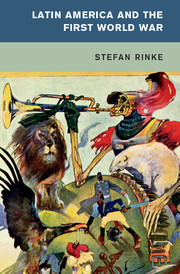Book contents
- Frontmatter
- Contents
- List of Figures
- Preface
- List of Abbreviations
- Introduction
- 1 The Global Context before 1914
- 2 Neutrality under Pressure, 1914-1917
- 3 In the Wake of War, 1917
- 4 Turbulent Paths into a “New Era,” 1918-1919
- 5 The Demise of a World
- 6 Nation and Trans-nation
- Epilogue: The Global Legacy of the World War
- Sources and Literature
- Chronology
- Index
2 - Neutrality under Pressure, 1914-1917
Published online by Cambridge University Press: 09 March 2017
- Frontmatter
- Contents
- List of Figures
- Preface
- List of Abbreviations
- Introduction
- 1 The Global Context before 1914
- 2 Neutrality under Pressure, 1914-1917
- 3 In the Wake of War, 1917
- 4 Turbulent Paths into a “New Era,” 1918-1919
- 5 The Demise of a World
- 6 Nation and Trans-nation
- Epilogue: The Global Legacy of the World War
- Sources and Literature
- Chronology
- Index
Summary
The grave events that unsettled the world in the years preceding the Great War were also felt in Latin America. One of the violent eruptions played out in the region in the form of the Mexican Revolution, which shook the confidence of Latin America's Europeanized upper strata. After the war broke out in Europe in early August 1914, the cycle of violence took on a new global dimension. The governments of Latin America wanted to stay neutral, putting their hopes in the quick end to the war that the strategists on both sides of the conflict had boastfully promised. The war, however, soon took on unprecedented dimensions: It neither passed by quickly, nor could the Latin Americans remain on the sidelines. Much to the contrary, the economic war and wartime propaganda that reached unprecedented scope made the consequences of the conflagration felt throughout the region from the beginning.
A HARBINGER OF VIOLENCE: THE REVOLUTION IN MEXICO
With a circulation of around 90,000, the publication Caras y Caretas in Buenos Aires was the largest and most professional Latin American magazine of the time. For its first issue after the outbreak of war in Europe on August 8, 1914, it printed a pictorial narrative with the title “The War: Children's Fairy Tales with Fatal Consequences for the Grown Ups.” Within its pages, the reader could see how the god of war, Mars, was bored with the peace conference at The Hague and therefore invented new weaponry (see Figure 2.1). After testing the arms and achieving the desired effect in Turkey, the Balkans, and Mexico, Mars embarked on even greater challenges, inciting panic across Europe. Apart from the fact that the series of images was a sample of the comic's immediate antecedents from the pen of Manuel Redondo, the publication is notable because the illustrator here draws what was an apparently obvious parallel between the eruptions of violence in prewar Europe and in Mexico.
Redondo's thinking is partly explained by a look at the historical developments in Europe and Latin America. Recent research shows that the Great War in Europe actually began before August 1914 with the fighting in the Balkans and in Africa. At the same time, the Mexican Revolution in Latin America marked an outbreak of violence that fit into the larger global context of the time.
- Type
- Chapter
- Information
- Latin America and the First World War , pp. 38 - 107Publisher: Cambridge University PressPrint publication year: 2017



